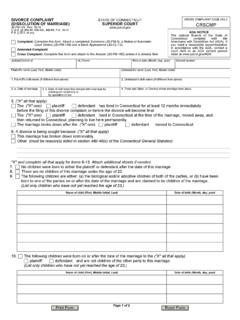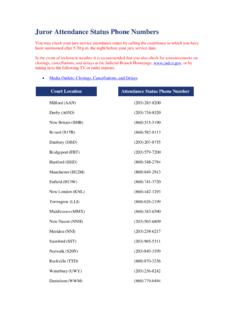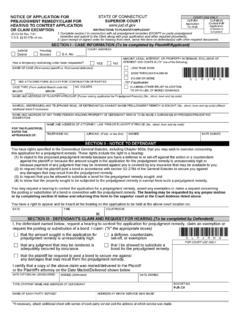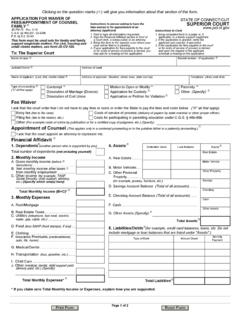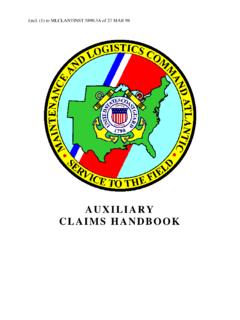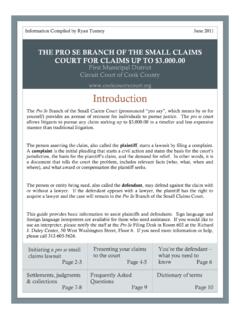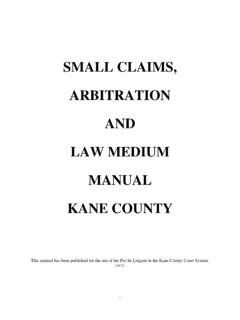Transcription of Form JDP-CV-45 Important Changes July 1, 2016 …
1 How small Claims Court WorksForm JDP-CV-45 Important Changes july 1, 2016 Page 10: Section 2 THE DEFENDANT S CASE(person being sued)How do I answer the claim ?2. If you think that the plaintiff owes you money, you may file a counterclaim against the plaintiff. If you file a counterclaim, you must pay a filing fee of $ to the clerk s office. The filing fee will be added to the amount of your judgment against the plaintiff if you win. Do not add the filing fee to the amount you claim the plaintiff owes you. Be clear about the amount of money you are asking for and the reasons for your counterclaim. If the amount of the counterclaim is more than the amount that can be sued for in small claims, see Transfer of Cases to the Regular Docket on page 12 for more information on moving your case to the regular Superior Court. (over)Page 30: Section 10 Fees Payable to the Clerk in small Claims CasesFiling (entry) fee ..$ *Filing of a Counterclaim ..$ *Motion to Transfer to the Regular Docket.
2 $ for Execution ..$ *Jury claim Fee ..$ *Motion to Open Judgment ..$ (per page) ..$ of Document ..$ *Fees that changed july 1, 2016 JDP-CV-45 INS (Rev. 7/16)How small ClaimsCourt WorksState of Connecticut Judicial BranchSuperior (the reasons for this booklet and how it can and cannot help you)This booklet was written by the Connecticut Judicial Branch and is based on the Connecticut General Statutes and Superior Court rules of practice in effect at the time the booklet was written. This booklet is provided as a public service and does not take the place of getting legal advice from a Connecticut who work for the court will help you with questions you have about how small Claims Court works. Those people cannot act as your attorney or give you legal advice. You are responsible for any actions you take. The court clerk s office is not responsible for anything that is wrong in this booklet or that is not in this booklet. If you think you need more information or help, you should talk with an attorney or read the sections of the Connecticut General Statutes and the Connecticut Practice Book that talk about small booklet has information in it that should help people who start a small claims case or who are sued in small claims court.
3 Many questions about this booklet and about the small claims process may be answered by the people who work in the court. You can get forms about the small claims process on-line at or at any clerk s office or court service OF CONTENTSI ntroduction (answers to basic questions) .. 1 Section 1 - The Plaintiff s Case (person who starts the case) .. 3 Section 2 - The Defendant s Case (person who is sued) .. 10 Section 3 - Transfer of Cases to the Regular Docket of the Superior Court .. 12 Section 4 - What To Do While You are Waiting for a Trial Date .. 13 Section 5 - The Trial Process (how the trial works) .. 15 Section 6 - Collecting the Judgment .. 17 Satisfaction of (receiving payment on) 19 Examination (asking questions) of the Judgment Debtor .. 20 Reminder .. 20 Section 7 - small Claims Area Facility Locations by Town ..21 Section 8 - small Claims Area Locations and Telephone 26 Section 9 - Superior Court Housing Sessions by District.
4 28 Section 10 - Court Fees .. 30 Section 11 - Forms .. 31JD-CV-40: small Claims Writ and Notice of 32-33JD-CV-122: How to Serve (Deliver to Defendant) a small Claims Writ and Notice of Suit .. 34JD-CV-123: Statement of Service - (Delivery) small 35JD-CV-121: Instructions to Defendant - (Notice to Person Being Sued) .. 36-37JD-CV-70: Withdrawal small Claims and Housing 38 Motion to Transfer to the Regular 39 Affidavit in Support of 40JD-CL-43: 41JD-CV-51: Motion to Open 42JD-CV-23: Post Judgment Remedies 43-44JD-CV-23a: 45-46JD-CV-3: Wage Execution Proceedings - Application, Order, 47-48JD-CV-3a: Exemption and Modification claim Form, Wage 49-50JD-CV-5: Property Execution Proceedings - Application, Order, Execution .. 51-52JD-CV-5b: Exemption claim Form, Property Execution .. 53-54JD-CV-24: Financial Institution Execution Proceedings Judgment Debtor Who is a Natural Person, Application and Execution .. 55-56JD-CV-24A: Exemption claim Form, Financial Institution Execution.
5 57-58JD-CV-24N: Financial Institution Execution Proceedings Judgment Debtor Who is NOT a Natural Person, Application and Execution .. 59- 60JD-CV-54: Petition for Examination of Judgment Debtor and Notice of Hearing .. 611 INTRODUCTION(answers to basic questions)What is small Claims Court ?The small Claims Court is a part of Connecticut s court system where a person can sue for up to $5, in money damages only. This amount is set by state law and may change from time to time. To find out the current amount, you may contact the Centralized small Claims office at 80 Washington Street, Hartford, CT 06106, telephone: (860) 756-7800 or toll-free in Connecticut 1-866-383-5927. You may also be able to get interest and costs. The only time that a person can sue for more than the $5, limit is in a lawsuit to have a landlord return a security deposit in a landlord-tenant matter. In that kind of case only, a person can sue for double the amount of the security deposit, plus interest that has been added to the amount, even if the doubled amount brings the claim over the $5, limit.
6 The small Claims Court does not hear libel and slander cases. Most small claims cases are heard by magistrates or approved small claims commissioners. small claims cases are not recorded; there is no transcript of the proceedings. Information about specific small claims cases can be found at: Claims/. That information may be searched by party name, docket number, court calendar, attorney case list, attorney calendar, and attorney search. If you lose the small claims case and you are ordered to pay money to the other person in the case (plaintiff or defendant), your ability to get credit may change . small claims judgments (decisions) are public information and could show up on your credit report. The laws that control Consumer Credit Reports are in Section 36a-695 of the Connecticut General Statutes and the sections that follow that section of the statutes. If you need paperwork from the court file to clarify with or to ask the Consumer Credit Reporting Agency for a change to an item on your credit report, you may get copies from the court file 2in your case.
7 $ per page is charged by the court clerk for most copies. If you have a complaint about a Consumer Credit Reporting Agency you may complain to the Connecticut Banking Department, Consumer Credit Division, 260 Constitution Plaza, Hartford, CT 06103-1800. Section 36a-695 of the Connecticut General Statutes. There is no appeal from small claims NOTE: By law, you must start your case within a certain amount of time. If you wait too long to start your case, you may lose your case. Please look at Chapter 926 of the Connecticut General Statutes for is the small Claims session different from other court sessions?The small Claims session of the Superior Court has simpler rules than the regular civil session of that court. small Claims forms are designed to be understood without legal training. The rules and forms are designed to allow the person or company suing (the plaintiff) to sue a person or company (the defendant) without the help of an attorney. Those rules and forms do not cover all situations.
8 You may file a small claims lawsuit against a person who lives out of state only if that person owns property in the state of Connecticut. A statement that the out-of-state person owns property must be included in the claim . You may also file a small claims lawsuit against out-of-state businesses, corporations and limited liability companies (LLCs).Do I need to hire an attorney?Attorneys may represent you in small claims court, but every part of the small Claims Court has been set up so a person can handle their own case from the start of the case to the end of the case. If you are representing yourself in your case, you must show the court all your proof. The court and the clerk s office will help you with the various steps in the case (the court process), but they can only help with the process. They cannot give you legal PLAINTIFF S CASE(person who starts the case)How do I start a small claims case (lawsuit)?Under the small Claims Rules of Practice in the Connecticut Practice Book (January 1, 2011), the person who files the case (the plaintiff) must serve (deliver) the lawsuit to each person they are suing (defendant) by 1 of the following 4 ways: priority mail with delivery confirmation; certified mail, return receipt requested; a nationally recognized courier service, with delivery confirmation, or; service (delivery) by a proper officer (for example, a state marshal).
9 Service (delivery) by a proper officer is required when the defendant is an out-of-state business (a business organized under the laws of a state other than Connecticut). There are also special service (delivery) requirements when the plaintiff sues an out-of-state insurance company. See the form How to Serve (Deliver to Defendant) a small Claims Writ and Notice of Suit in Section 11 of this booklet. The plaintiff must pay the cost of service but can get the cost back from the defendant if the plaintiff wins the small claims case and is able to collect the money awarded in the judgment from the defendant. The statute of limitations is a time limit on how long a plaintiff has to start a case. If the claim is a debt or obligation incurred primarily for personal, family or household purposes, the plaintiff will need to give the reasons why the plaintiff believes that the statute of limitations time limit has not run plaintiff must also show how he or she knows that the address given for each defendant is accurate and how the address was checked within the 6 months before starting the lawsuit.
10 The following documents must be filled out Fill-out the small Claims Writ and Notice of Suit (JD-CV-40) form. 4 The form should be typed or printed neatly so it can be read. Please remember that the form is a legal document. The clerk s office will not accept your case if any copies of the form cannot be read. Do not white-out or cross-out any information you put on the form. The name of the person or business you are suing (the defendant) must be its exact, correct legal name. If you make a mistake and put the wrong name on the form, you may not get your money. You may not use initials, nicknames, or abbreviations of any person or business you are suing. For example, Richard Jones cannot be sued as R. Jones or Dick Jones. If you leave out any part of any name on the form, you may not get your money. (See the sample small Claims Writ and Notice of Suit form in Section 11 of this booklet.)There are numbered Instructions to Plaintiff to help you fill out each part of the form.





